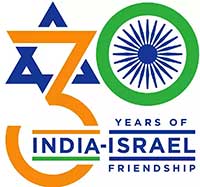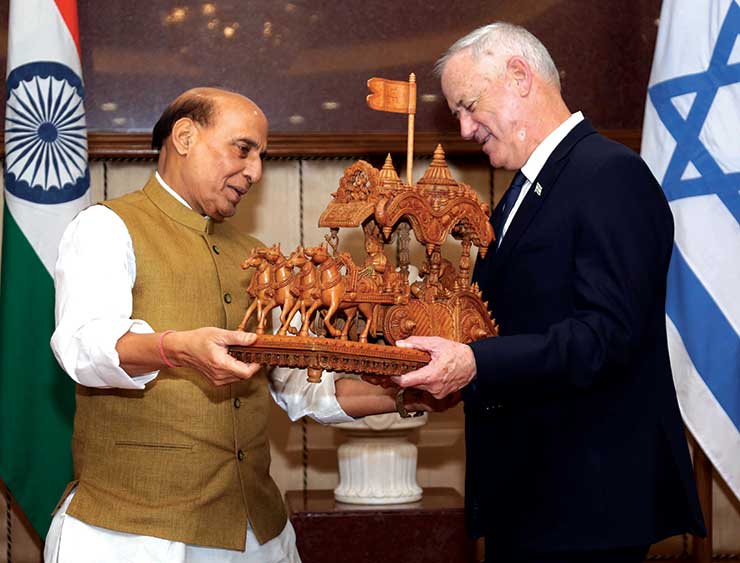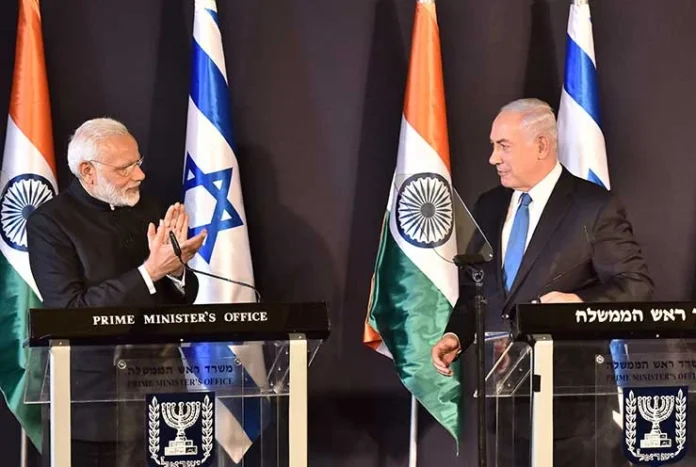 On January 29, 2022, India and Israel celebrated 30 years of diplomatic relations. Both countries today have strategic relations in a wide range of sectors such as defence, agriculture and trade which started three decades ago. Since its inception in 1948, the Jewish state wanted to have full diplomatic relations with India. However, Indian Prime Minister Jawaharlal Nehru (1947-1964) adopted a pro-Arab policy because of domestic, and international compulsions. Nevertheless, Israel was always ready to assist India in times of need.
On January 29, 2022, India and Israel celebrated 30 years of diplomatic relations. Both countries today have strategic relations in a wide range of sectors such as defence, agriculture and trade which started three decades ago. Since its inception in 1948, the Jewish state wanted to have full diplomatic relations with India. However, Indian Prime Minister Jawaharlal Nehru (1947-1964) adopted a pro-Arab policy because of domestic, and international compulsions. Nevertheless, Israel was always ready to assist India in times of need.
Israel shared intelligence and provided weapons to India during its war against China in 1962 and its wars against Pakistan in 1965 and 1971. Following the establishment of the Research and Analysis Wing (RAW) in 1968, PM Indira Gandhi (1966-1977) allowed R. N. Rao, to develop secret relations with the Israeli Mossad which operated as an alternate diplomatic service of the Israeli foreign ministry and maintained relations with intelligence agencies of countries that did not have diplomatic relations with Israel. The Mossad was able to overcome the political and economic restrictions that India imposed on Israel by offering military, medical and agriculture assistance through secret and informal channels.
In the late 70s when the Janata Party came to power after defeating the Congress party, Israel hoped that Prime Minister Morarji Desai and his Minister of External Affairs (MEA) Atal Bihari Vajpayee would change their policy towards the Jewish state. However, the Minister for External Affairs Vajpayee was not willing to upset the relations with Arab and Muslim states in West Asia and continued to maintain an anti-Israeli approach. However, India continued to officially promote a pro-Arab policy while maintaining back-door relations with Israel through secret channels. In August 1977, Israel MEA Moshe Dayan secretly visited India and met PM Desai. The Indian PM’s office and Intelligence agency organised the meeting without involving India’s foreign ministry. The objective of the meeting was to normalize the relations between the two countries. Before Dayan’s visit to India, PM Desai and Israeli Defence Minister Ezer Weizman secretly met in the United Kingdom. The purpose of this meeting was to sell Israeli technologies to India. In June 1979, Desai’s principal secretary V. Shankar paid an official visit to Israel to procure weapons and ammunition via Cyprus.
During her second term in power, Indira Gandhi (1980-1984) continued to promote a pro-Arab policy and condemned Israel for destroying the Iraqi nuclear facility Osirak in 1981 and invading Lebanon in 1982. Israeli Consul in Mumbai Yossef Hassin criticized India’s approach toward the Jewish state. India reacted to this by expelling the Israeli Consul and severing its relations with Israel in 1982. However, PM Indira Gandhi allowed the Indian intelligence agencies to consult Israel on security and intelligence matters.
Meanwhile, Rajiv Gandhi (1984-1989) who came to power after Indira Gandhi’s assassination in 1984 had a different approach to politics and foreign policy. He was not tied to the traditional policy of the INC or afraid to engage with countries like the United States (USA), China and Israel that did not have good relations with India. In September 1985, he met Israeli PM Shimon Peres at the United Nations (UN). This was the first time that the PMs of both countries met. However, in spite of his willingness to improve the relations between the countries, Rajiv Gandhi wasn’t able to do much because of domestic pulls and pressures.
Finally, when P. V. Narasimha Rao became Prime Minister after Rajiv Gandhi’s assassination in 1991, there was significant thawing of relations between the two countries. Eventually, India and Israel resumed full diplomatic relations on January 29, 1992. But despite the willingness among the top leaders to renew the old ties and move forward, PM Narasimha Rao was compelled to adopt a more cautious approach towards Israel because many Indian politicians were not fully in favour of enhanced defence cooperation with Israel. Hence, both countries mainly signed agreements in the fields of economy, science, culture, and tourism. Though many Israeli defence and security companies wanted to engage with India, there were quite a few obstacles in the path which prevented both countries to develop defence cooperation.

Finally when the Bharatiya Janata Party (BJP) came to power with Atal Bihari Vajpayee as PM defence cooperation between the two countries expanded significantly. Vajpayee believed India should conduct a more pragmatic policy to promote its national interest. He perceived Israel to be an important military partner to modernize the Indian army and share intelligence to fight terrorism and radical Islam. India decided to procure light ammunition and upgrade the combat electronic systems of its INS Virat.
In May 1998, when India conducted nuclear tests and the US imposed sanctions forbidding other countries from selling military equipment and technologies to India, Israel stood by India. Israel was perhaps the only country that did not condemn India for conducting the nuclear tests or imposed an embargo on India. Rather an Israeli delegation visited India to sell electronic equipment for Indian warplanes.
In May 1999, when the Kargil War erupted following the Pakistani infiltration in Jammu and Kashmir, Israel proved to be a reliable partner and provided India with the necessary military equipment to address the security threat and expel the Pakistani forces from its soil. Since that day, many analysts believe India should expand its relations with Israel for border security purposes.
Despite speculations to the contrary, Manmohan Singh who succeeded Atal Bihari Vajpayee as PM (2004-2014) did not cancel any military agreement signed during Vajpayee’s tenure and extended the military relations by acquiring Phalcon systems and Surface to Air Missiles (SAM).
Likewise, Narendra Modi wanted to expand the relations between both countries to a strategic level and promote the ‘Make in India’ initiative to increase the development of the industrial sector in India. Israeli PM Benjamin Netanyahu was in favour of this policy, as he believed it will diversify Israel’s manufacturing opportunities.
Israel today is India’s second-largest defence supplier after Russia. Both countries extended their defence relations not only on the bilateral level but also on the multilateral level together with the US and Gulf countries, following the signing of the Abraham Accords in August 2020. In June 2022, Israeli Defence Minister Benny Gantz paid an official visit to India. During his visit, both countries signed agreements which will expand the collaboration and development of futuristic defence technologies. Different regional and international dynamics will lead both countries to extend their defence cooperation on the bilateral and multilateral levels.
– The writer is a Guest Lecturer and Teaching Assistant at Reichman University (IDC Herzliya), specializing in India-Israel relations. The views expressed are personal and do not necessarily reflect the views of Raksha Anirveda





